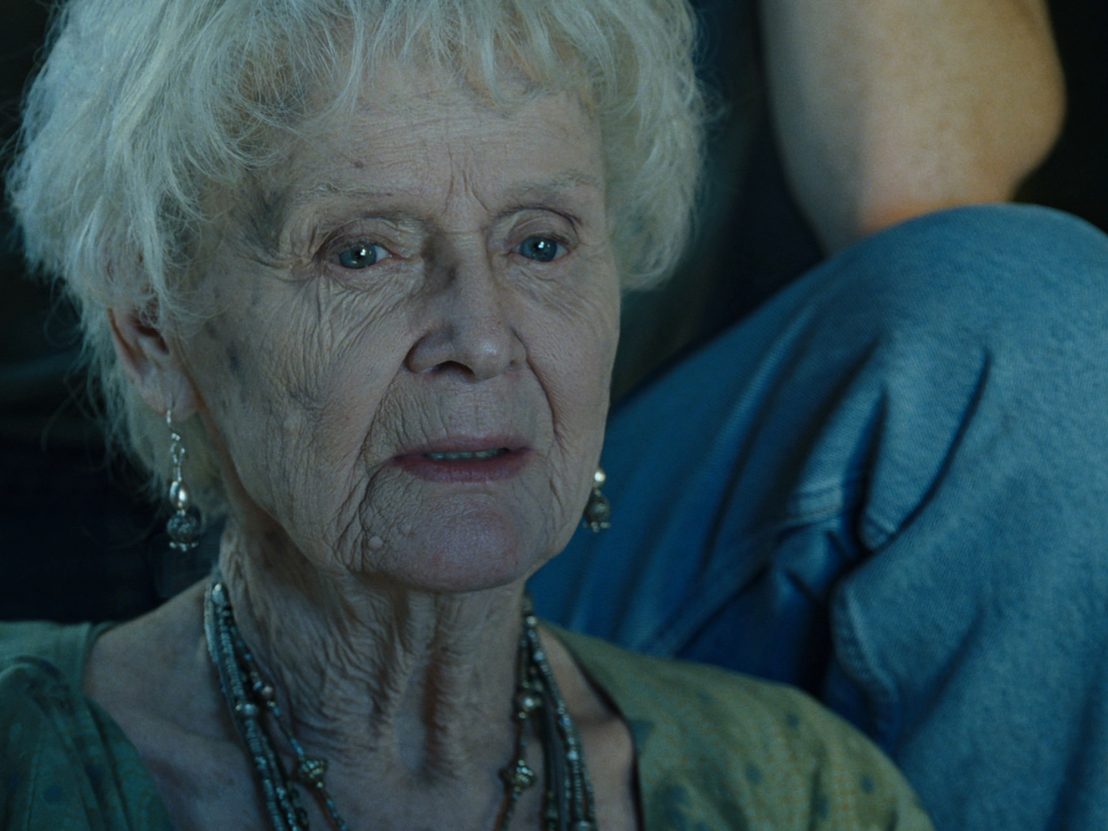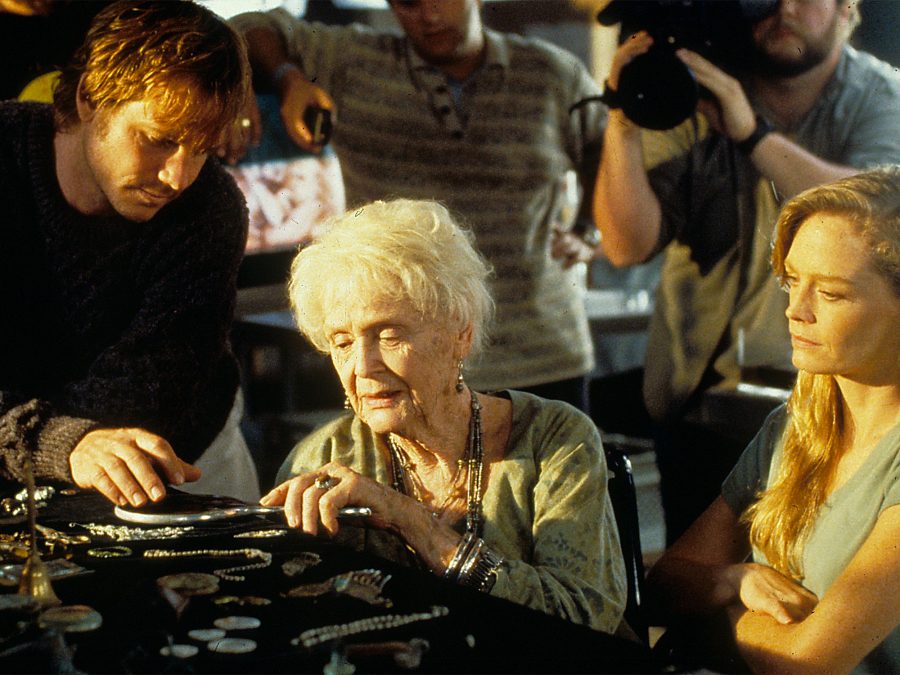
It’s been 25 years since the release of Titanic, James Cameron’s record-breaking epic that chronicles a doomed romance aboard the disaster-bound ship, and audiences still have a lot of opinions about it. ‘Jack could have fit on that door’, ‘Cal is a ridiculous villain’ – you know the drill. The most common complaint, though, is the film’s length.
Titanic clocks in at an admittedly hefty 3 hours and 14 minutes, and naysayers suggest that the framing device – in which our protagonist Rose (played in her old age by Gloria Stuart) reflects on her past – should have been cut. I’ll acknowledge that it’s less immediately satisfying to spend time with this character. Unlike her younger self (Kate Winslet), she doesn’t get to do Irish jigs, have illicit sex in the back of a fogged-up car or hack through handcuffs with an axe. But the elderly Rose is the backbone of the entire film. Without her, and her connection to the present, the film’s emotional impact would suffer.
As a reminder for those who last watched Titanic between ITV ad breaks several Christmases ago, we first meet Rose at the grand old age of 100 – therefore Stuart is charged with establishing her personality before passing the baton to Winslet. Rose’s character traits are largely consistent across the two timelines. She is observant when catching a low-volume TV news item about the Titanic in 1997, which squares with how she noticed the lifeboat shortage on its decks in 1912. She’s cheeky with the crew on the scientific-research vessel the Keldysh as a pensioner (throwing out a teasing “Do you want to hear this story or not?” after being interrupted) and is equally sharp-tongued with her mother as a teenager (“Oh, stop it […] you’ll give yourself a nosebleed”).
For all their similarities, Old Rose’s defining characteristic is her strength of will, which cannot be said of her adolescent counterpart. On the Keldysh, she questions the deep-sea explorers’ understanding of the Titanic, angrily shuts down her granddaughter’s attempts to take her to rest, and, at the film’s climax, tosses the 56-carat-diamond Heart of the Ocean necklace overboard. This is a woman driven by id, who thumbs her nose at authority.
We get flickers of this steadfastness in the 1912 timeline, and yet her little rebellions are initially crushed under the oppressive weight of upper-class mores. Early on, Young Rose blows smoke in her mother’s face only for her fiancé Cal (Billy Zane) to stub out her cigarette – a metaphorical extinguishing of the fire Jack (Leonardo DiCaprio) cherishes in her. Later, she asserts her independence to Cal and is greeted with his terrifying, table-flipping rage, which leads her to draw inward and silence herself.
Over the course of the film, however, we see Young Rose’s resolve calcifying, her proximity to death emboldening her to act on impulse. Cameron’s script, built on a network of echoes and callbacks, neatly signposts her development in a pair of parallel scenes. Where a self-conscious Rose was reluctant to spit off the boat deck in the first act, by the third she is spraying saliva in Cal’s face, bellowing out the iconic line “I’d rather be his whore than your wife!” after he confronts her about her dalliance with Jack. Old Rose completes Young Rose’s character arc. Through her, we find out that she continued to fan the flames of her inner fire, keeping alive what Jack loved about her – as well as her true self.

Another crucial narrative function Old Rose serves is to force the Keldysh’s crew to reckon with the tragedy of Titanic’s maiden voyage, which claimed more than 1,500 lives. So focused are they on securing a priceless diamond that they’ve become inured to the ship’s horrors.
Describing their attitude to the sinking as dismissive would be generous. Bodine (Lewis Abernathy), in particular, makes light of it in a string of insensitive jokes, but his worst offence is his giddy-schoolboy explanation to Old Rose of how the Titanic sank as if it were some sort of video game. The scene – which also maps out the geography of the ship for viewers ahead of the film’s pivot into full-blown action spectacle – shows that Bodine has a purely intellectual grasp on what happened, divorced from human consequence.
It is not until Old Rose begins telling her story that Bodine, and his colleagues, realise how traumatic it was to be shipwrecked in the North Atlantic. Every time we cut back to the Keldysh, he is more invested. He goes from eye-rolling cynicism to hanging on her every word, and even asks for more information. By the time Old Rose has detailed the passengers’ screaming desperation and icicle-ridden corpses, Bodine is glassy-eyed, pensively stroking his beard. Along with his crew, he has undergone a seismic shift.
Now, they feel the loss of Titanic, and are less concerned with their grave-robbing pursuit of finding the necklace. As Bill Paxton’s Brock puts it in the film’s final moments: “Three years, I’ve thought of nothing except Titanic; but I never got it… I never let it in.” Yes, she’s a fictional character in a historical drama, but Old Rose effectively memorialises the real-life people who passed.
More than a vehicle for the explorers’ catharsis, 100-year-old Rose offers this same emotional closure for the audience. Her, and the movie’s, closing scene is arguably the most heartbreaking. The camera tracks across a series of framed photographs on her bedside table. We see Rose, in her youth, leading a life of adventure: riding a horse, going to a funfair, showing off a fresh catch.
Each of these sepia-toned pictures refers to an activity she planned to do with Jack. It’s a perfect, bittersweet revelation – a further example of Cameron’s smart narrative payoffs. Despite Jack’s untimely death, Rose still lived out her days in the free-spirited way he encouraged her to. These snapshots demonstrate that she never let go of the promise she made him and, just as he envisioned for her, “die[s] an old lady, warm in her bed”. Old Rose anchors us in Titanic’s sweeping emotions. She ensures that our hearts will go on.
Published 19 Dec 2022

A gaudy blue folly which encapsulates James Cameron’s strength as an image-maker, but weakness as a storyteller.

One of the most successful filmmakers of all time talks Alita: Battle Angel, Avatar and the future of cinema.

By Lara C Cory
Thirty years on, Sigourney Weaver’s iconic hero stands as a defiant symbol of gender equality.